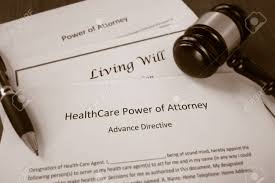 What are advance directives and why should everyone have them? Advance directives allow you to plan for the possibility that you may one day be unable to make your own medical and financial decisions. In doing so, there can be confusion about the differences between the various advance directives.
What are advance directives and why should everyone have them? Advance directives allow you to plan for the possibility that you may one day be unable to make your own medical and financial decisions. In doing so, there can be confusion about the differences between the various advance directives.
Among the most important advance directives are:
- a living will
- a “do-not-resuscitate” order (DNR)
- a designation of health care surrogate
-
-
-
-
-
-
-
-
-
-
-
-
-
-
- a HIPAA release and authorization
- a durable power of attorney for finances
-
-
-
-
-
-
-
-
-
-
-
-
-
-
While all of these documents are advance directives, they serve different purposes.
Living Will. A living will is a document that you can use to give instructions regarding treatment if you become terminally ill or are in a persistent vegetative state and unable to communicate your instructions. The living will states under what conditions life-sustaining treatment should be terminated. If you would like to avoid life-sustaining treatment when it would be hopeless, you need a living will. A living will takes effect only when you are incapacitated and is not set in stone — you can always revoke it at a later date if you wish to do so. When drawing up a living will, you need to consider the various care options and what you would like done. You need to think about whether you want care to extend your life no matter what or only in certain circumstances. A living will can dictate when you want a ventilator, dialysis, tube feeding, blood transfusions, and other life-saving or life-prolonging options.
A living will should not be confused with a “legal will” or “last will.” The last will is a document that allows you to designate the person(s) who will administer your probate estate. Those individuals then collect your assets, pay reasonably ascertainable creditors and the expenses of administering the estate, and then distributes your remaining assets to those people you have identified as the beneficiaries of your estate.
An alternative to a living will is what is sometimes called a “will to live” or an “annotated living will.” The will to live expresses your desires that life-sustaining measure be taken to maintain your life through whatever measures are available. Alternatively, it can direct your health care providers with regard to how you would like them to deal with different situations that may arise from different medical scenarios. The will to live or annotated living will may result in extraordinary measures being used to maintain or extend your life.
 Do Not Resuscitate Order. A DNR is a different document. A DNR says that if your heart stops or you stop breathing, medical professionals should not attempt to revive you. This is very different from a living will, which only goes into effect if you are unable to communicate your wishes for care. Everyone can benefit from a living will, while DNRs are only for very elderly and/or frail patients for whom it wouldn’t make sense to administer CPR.
Do Not Resuscitate Order. A DNR is a different document. A DNR says that if your heart stops or you stop breathing, medical professionals should not attempt to revive you. This is very different from a living will, which only goes into effect if you are unable to communicate your wishes for care. Everyone can benefit from a living will, while DNRs are only for very elderly and/or frail patients for whom it wouldn’t make sense to administer CPR.
Designation of Health Care Surrogate. In addition to a living will, you will also need a health care proxy or broader medical directive. In Florida, that document is called a “designation of health care surrogate.” The designation of health care surrogate allows you to identify and designate the person, or persons, you want to make medical decisions for you when you are unable to communicate with your health care providers. You can prepare a Florida compliant Designation of Health Care Surrogate at this website for $49.00.
HIPAA Release and Authorization. The HIPAA release and authorization allows you to authorize your health care providers to disclose information about your medical condition, treatment options, or prognosis, to various listed individuals. These individuals that you authorize to obtain information may include those who will be making decisions for you but can also include others who will not be making health care decisions for you. For instance, you may want all of your children to be able to discuss your medical condition, treatment options, and prognosis, but you may have specific children who you want to designate to make medical treatment decisions when you can no longer communicate with your physicians.
 Durable Power of Attorney for Finances. The durable power of attorney allows you to designate who you want to make financial, legal, and business decisions for you when you are unable to make those decisions for yourself. The durable power of attorney is a very powerful document. It should be drafted to minimize the opportunity for abuse by the agent you name as your attorney in fact.
Durable Power of Attorney for Finances. The durable power of attorney allows you to designate who you want to make financial, legal, and business decisions for you when you are unable to make those decisions for yourself. The durable power of attorney is a very powerful document. It should be drafted to minimize the opportunity for abuse by the agent you name as your attorney in fact.
Each and every one of these advance directives can be revoked or modified at any time, so long as you have the legal capacity to revoke or modify them. Each advance directive has various requirements requiring a specified number of witnesses, a notary public, or both, for the legal documents to be properly signed. If those requirements aren’t met, the documents are not legally valid. Revocation of the authority provided by the various advance directives must be in writing and must be communicated to the agent in each case.
You can prepare a designation of health care surrogate, living will, and durable power of attorney for finances, that are compliant with Florida law, at this website for only $75.00. The cost of the legal documents at this website is significantly below the typical cost of the documents. All of the documents are prepared by our experienced elder law and estate planning attorney. We can also answer any questions you might have about advance directives.